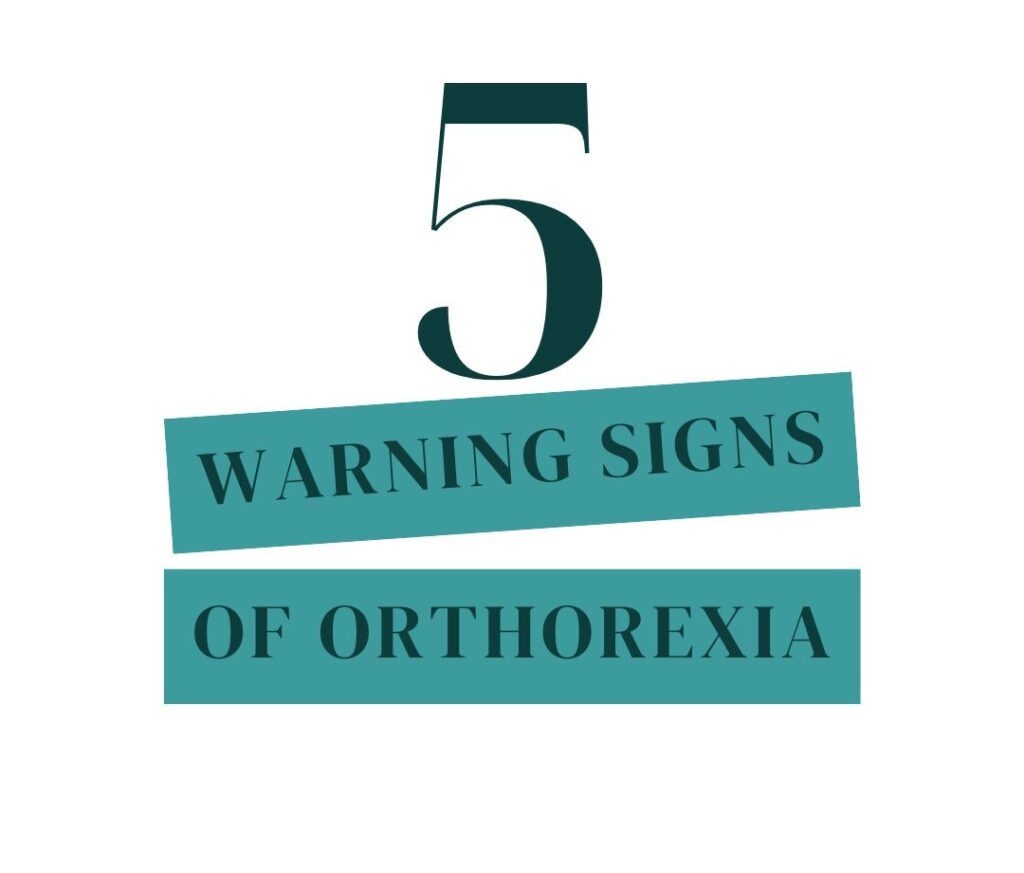Orthorexia nervosa, a term coined by Dr. Steven Bratman in 1997, is a condition characterized by an unhealthy obsession with eating foods perceived as healthy. While not officially recognized as a distinct eating disorder in the DSM-5, orthorexia is gaining attention in the medical community due to its potentially severe impact on physical and mental health. In this article, we’ll explore the five major warning signs of orthorexia and provide additional insights into this complex condition.
Introduction to Orthorexia
Orthorexia begins as a well-intentioned attempt to eat more healthfully but evolves into a fixation on food quality and purity. Unlike other eating disorders that focus primarily on quantity, orthorexia is centered on the perceived virtue of the food consumed. This preoccupation with “clean eating” can lead to significant health problems and interfere with daily life.
The Five Major Warning Signs of Orthorexia
Obsession with Food Quality and PurityThe first and most prominent warning sign of orthorexia is an extreme preoccupation with the healthiness and purity of food. Individuals with orthorexia may:
- Spend excessive time researching, cataloging, and measuring food
- Become fixated on reading nutrition labels and ingredient lists
- Cut out entire food groups deemed “unhealthy” or “impure”
- Experience heightened concern about pesticides, additives, and artificial ingredients
This obsession often goes beyond general health consciousness and becomes all-consuming, dominating thoughts and behaviors.2.2 Rigid Eating Patterns and Food RulesThe second warning sign involves the development of strict, self-imposed dietary rules. People with orthorexia may:
- Follow an increasingly restrictive diet
- Refuse to eat foods prepared by others or outside the home
- Experience anxiety when unable to follow their dietary regimen
- Engage in elaborate food preparation rituals
These inflexible eating patterns can lead to nutritional deficiencies and social isolation.2.3 Emotional Distress and GuiltThe third warning sign is the presence of intense emotional reactions related to food choices. Individuals with orthorexia often experience:
- Feelings of guilt, self-loathing, or anxiety after eating foods deemed “unhealthy”
- A sense of superiority or righteousness when adhering to their diet
- Mood swings and emotional instability related to food choices
- Increased stress and anxiety around meal planning and preparation
These emotional responses can significantly impact mental health and overall well-being.2.4 Social Isolation and Interference with Daily LifeThe fourth warning sign is the extent to which orthorexic behaviors interfere with social relationships and daily functioning. This may include:
- Avoiding social gatherings or restaurants due to food-related anxiety
- Spending an inordinate amount of time planning and preparing meals
- Difficulty maintaining relationships due to rigid dietary beliefs
- Neglecting work, school, or other responsibilities in favor of food-related activities
As orthorexia progresses, it can lead to significant social withdrawal and impairment in various life domains.2.5 Physical Health ConsequencesThe fifth warning sign involves the physical health impacts of orthorexia. Despite the intention to improve health, orthorexic behaviors can lead to:
- Malnutrition or nutritional deficiencies
- Significant weight loss (though not always present)
- Weakened immune system
- Gastrointestinal issues
- In severe cases, medical complications similar to those seen in anorexia nervosa
It’s crucial to recognize that the pursuit of health through extreme dietary restrictions can paradoxically result in serious health problems.
Also Read: Sara Blake Cheek Age Wiki Biography, Net worth, Zodiac Sign
Additional Symptoms and Behaviors
Beyond the five major warning signs, individuals with orthorexia may exhibit other symptoms and behaviors, including:
- Compulsive checking of ingredient lists and nutritional labels
- An inability to eat anything but a narrow group of foods deemed “healthy” or “pure”
- Unusual interest in the health of what others are eating
- Spending hours thinking about what food might be served at upcoming events
- Showing high levels of distress when “safe” or “healthy” foods aren’t available
- Obsessive following of food and “healthy lifestyle” blogs on social media
Causes and Risk Factors
The exact causes of orthorexia are not fully understood, but several factors may contribute to its development:
- Perfectionism and obsessive-compulsive tendencies
- History of anxiety or eating disorders
- Exposure to diet culture and “clean eating” trends
- Desire for control in one’s life
- Fear of illness or health complications
- Cultural emphasis on health and wellness
It’s important to note that orthorexia can affect individuals of any age, gender, or background, though it may be more common among young adults and middle-class individuals.
Also Read: Bibian Norai Wiki Biography, Net worth, Zodiac Sign
Diagnosis and Treatment
Currently, orthorexia is not officially recognized as a distinct eating disorder in the DSM-5. However, many healthcare professionals acknowledge its severity and treat it similarly to other eating disorders. Diagnosis often involves a comprehensive evaluation of eating behaviors, thoughts, and their impact on daily life.Treatment for orthorexia typically includes a multidisciplinary approach:
- Cognitive-behavioral therapy (CBT) to address distorted thoughts about food and health
- Nutritional counseling to develop a balanced, flexible approach to eating
- Exposure therapy to reduce anxiety around “fear foods”
- Medical monitoring to address any physical health complications
- Support groups or family therapy to improve social support
The goal of treatment is not to discourage healthy eating but to help individuals develop a more balanced and flexible relationship with food.
Conclusion
Orthorexia is a complex condition that can have serious consequences for both physical and mental health. Recognizing the five warning signs – obsession with food quality, rigid eating patterns, emotional distress, social isolation, and physical health impacts – is crucial for early intervention and treatment.If you or someone you know is exhibiting these warning signs, it’s important to seek help from a healthcare professional. Remember, true health encompasses not just physical well-being but also mental and social health. A balanced approach to nutrition, free from obsession and extreme restrictions, is key to overall wellness.
By raising awareness about orthorexia and its warning signs, we can help individuals struggling with this condition find the support and treatment they need to develop a healthier relationship with food and improve their quality of life.





